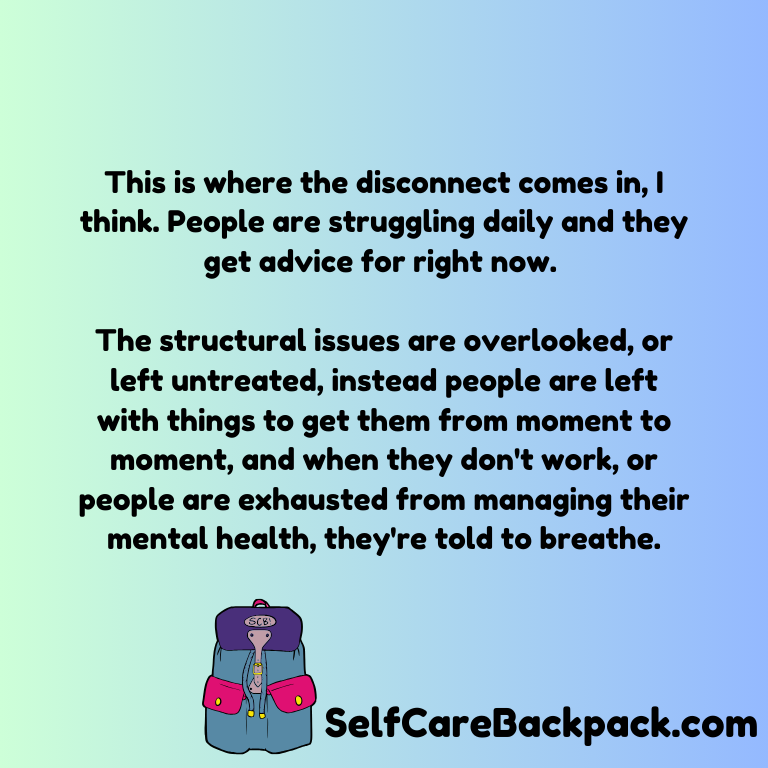The tension of the moment self care advice
I want to talk about something I think we miss when we give out in-the-moment self care advice, and that's why to do the thing.
A disclaimer, or a clarification before I go on: access to mental health support is generally fucked in most places, with access being really really difficult, before you think about finding the right therapist, type of therapy, drugs, etc. I don't want to take away from this, but I want to talk about a failing in how we talk about grounding, self-soothing, and other self care activities.

What are in-the-moment self care activities?
This is what I call the things we can do to help our self care in the present moment. Taking a moment to do some breathing exercises, checking in with our body to see if we need anything physically, taking a screen break, etc. It's small things that have the dual purpose of bringing us back to the present, single moment and to make us physically feel better.
We talk about grounding without talking about why grounding works, or what it does. It feels really dismissive when you're struggling to be told to breathe, take a bath, have a cup of tea (A CAMHS classic, from what I've seen).
These are all forms of self-soothing, or ways to build up distress tolerance.
The idea is that doing these actions will help you sit with these feelings and move through them, without having to take action.
From my experience with anxiety, learning to sit with uncertainty and not 'give in' to my anxiety was made up of these moments. Instead of double checking with a friend that they didn't secretly hate me, or trying to gain control of a situation, I had to learn to sit with that anxiety. In these moments taking a couple of deep breaths, or making myself a cup of tea, is a way of focusing on the here and now, not the what-ifs. It stills my mind for a moment, and reminds myself that I can let this anxiety move through me.
Practising that makes it easier, long term. Not easy, I still have to actively remind myself to do this at times, but easier than it was.
Doing these kinds of grounding exercises are also better than dissociation. Distraction works, but it needs to be more helpful than simply dissociating. Going for a walk, or talking to a friend (not about your distress, but other things), can all take your mind off things without disconnecting from yourself entirely. Walking or getting outside in some way will allow you to connect to yourself physically, as well as connecting to nature (or, at least, the outside). Talking to a friend or loved one will help you connect to others.
The issue is is that by itself, it won't help with a more severe mental illness. Distress tolerance or self soothing activities are great for learning to sit with your feelings, sit with uncertainty, and learn to move through them without working to gain outside reassurance or control of a situation.
But it didn't help with the roots of my anxiety or trauma, which requires a lot of unpicking. In my case, I needed a therapist and some SSRIs.
This is where the disconnect comes in, I think. People are struggling daily and they get advice for right now. The structural issues are overlooked, or left untreated, instead people are left with things to get them from moment to moment, and when they don't work, or people are exhausted from managing their mental health, they're told to breathe.
I have no answers or great conclusion for this piece to be honest. It's something that's been on my mind a lot, especially since I started volunteering at a crisis line. I talk to people who are struggling and all I can do is offer them an ear, and help them in this moment. I'm not denying this is powerful and useful - being listened to without judgement can change someone's life - but there's nothing to provide support on top of this work.
I'm conflicted. Learning how to soothe myself and tolerate distress is a foundational part of my anxiety management. It's difficult, requires practice, but does work. Finding out how best to do this in the moment care is part of how I've learned to be kind to myself, and I recommend that everyone thinks about what grounding means to them and how to do it best for themselves.
On the other hand, as someone once said: breathing exercises aren't going to fundamentally help my BPD, are they?
This is a free post, so please feel free to share it with anyone who'd enjoy it. My work is reader supported, so if you liked this you can check out my archive, subscribe, or upgrade to a paid subscription for as little as £5 a month.
Finally: I'm getting a new logo soon! The old one is still beloved by me, and shout out to my dear friend Bruce for making this one for me. I'll still have it around (I still have some stickers with it on <3), but I'm having a bit of a refresh in general and I can't wait to share it with you all :D
Add a comment: